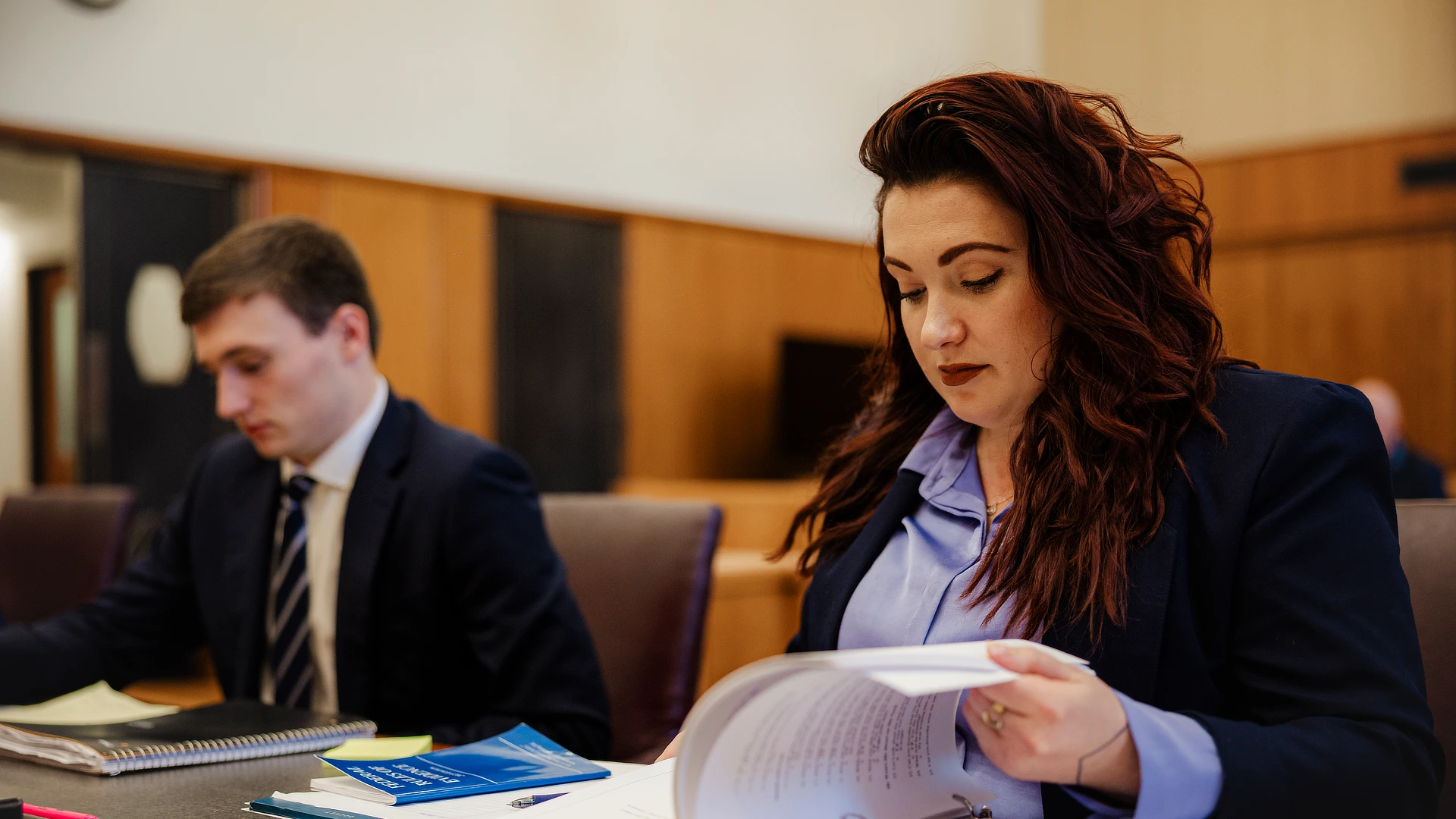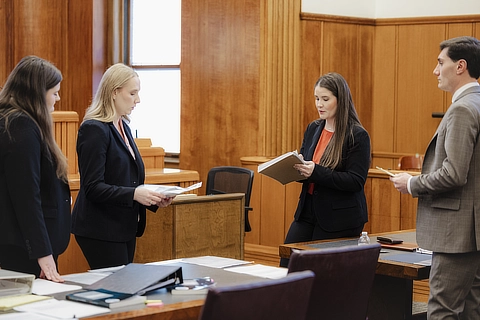Practice Ready: We Set the Trend
Established in 1847, Cumberland School of Law is one of the oldest law schools in the country. The school was founded by Judge Abraham Caruthers, an innovator in legal education. In a time when legal study was conducted by apprenticeship or through lectures, the law school pioneered an instructional method based on intensive trial practice. This laid the foundation for what is today widely acclaimed as one of the nation's finest programs in trial advocacy.
U.S. News & World Report ranked Cumberland School of Law 4th (2025) among all U.S. law schools for its trial advocacy program.
Cumberland School of Law trains aspiring lawyers to think strategically and tactically, in and out of the courtroom. Unique among law schools, Cumberland School of Law students can participate in trial and appellate advocacy competitions their first year.
From Evidence in the first year of law school to the capstone class of Advanced Skills in Trial Advocacy, Cumberland offers an outstanding curriculum in advocacy. Additional courses are offered for every aspect of advocacy: mediation, negotiation, drafting, complex litigation and client counseling. With each skill, Cumberland School of Law also offers competition opportunities for students who want that opportunity to practice. Advanced courses ensure that students have the latest knowledge, encompassing technology in the courtroom and e-discovery. Clinical education includes externships with opportunities in judicial, litigation, corporate, government and public interest placements. These allow students to try out their skills in real-world settings. This comprehensive advocacy training approach equips students with the lawyering skills needed to be prepared advocates for every legal career.
Skills Development
At Cumberland School of Law, students have opportunities for realistic jury trial training above and beyond most law schools. The entry-level trial advocacy course is basic skills in trial advocacy. In this class, students master the basics of each component of a trial. A full-time faculty member teaches students how to perform each skill. Outstanding guest attorneys provide demonstrations. Extensive hands-on student exercises in classes of eight students follow each week. Students practice and perform these skills until they are mastered through bench and jury trials.
Students who want to take their trial skills to the next level and incorporate the latest courtroom technologies take advanced skills in trial advocacy. Enrollment in this advanced course is limited to 12 students per semester, with selection based on merit. The course is the ultimate in realistic trial skills training. Everything is performed in the most realistic manner possible, including using real child witnesses and doing direct and cross examinations of actual physicians, forensic accountants, document examiners and arson experts. Throughout the semester, students master the use of technology while presenting a case in the law school’s state-of-the-art Hare, Wynn, Newell & Newton Advanced Advocacy Courtroom. All classes are videotaped so the student and the instructor can review the performance by logging on through any Internet connection. Advanced skills in trial advocacy culminates in a jury trial tried before real judges and juries of local citizens. Each student uses technology to present evidence. Witnesses include actual law enforcement agents and forensic chemists. The student attorneys watch juror deliberations via cameras.
Cumberland School of Law provides opportunities for all students to develop skills in their areas of interest. Beyond the first year, courses are offered in scientific and advanced evidence, complex litigation, mediation and negotiation, and legal drafting. Skills courses are limited to as few as eights, ensuring each student receives personalized instruction. In each area, students may practice further with intramural competitions or represent the law school at regional and national competitions. When students are ready to try their skills in the real world, Alabama law allows third-year students to handle real cases under supervision. Students who successfully complete a prescribed curriculum can earn a certificate in trial advocacy.
Advocacy Courses
Basic Skills in Trial Advocacy
Taught by a professor and five practicing attorneys from both sides of the V in criminal and civil practice. Students write and deliver an opening statement, direct examinations, cross examinations, and closing arguments. The class culminates in two full trials. One trial concerns a student suing a university for failure to protect the student from cyberbullying. The final trial is a criminal case in which the defendant shot and killed his ex-girlfriend’s new partner, an MMA fighter. The defendant claims self-defense.
Alabama Criminal Practice and Procedure
An experiential course in which students prosecute and defend criminal defendants charged with crimes such as DUI, Trafficking and Robbery. The course simulates the day-to-day life of criminal practice, beginning at arrest and culminating in sentencing.
Advanced Trial Skills: Criminal
The Advanced Trial Advocacy Criminal class exposes students to the complex issues that arise during a criminal prosecution. Students will perform as prosecutors or defense attorneys using various trial problems. Students will also prepare and examine real criminal case expert witnesses. The course will emphasize practical advocacy skills in a courtroom setting, as well as the integration of modern technological resources to enhance presentation to a jury.
Advanced Trial Skills: Civil
This course picks up where Basic Skills in Trial Advocacy leaves off and takes students to the next level in trying a case to a jury. The course begins with key concepts in communication. At the same time, students refresh their knowledge of evidence and conduct case analysis. Students will then practice simulations of each part of a jury trial. The semester culminates in students trying a case to a real jury. Each student will use an iPad with Lit Software and Notability for preparing and presenting cases.
Depositions and Technology
This course focuses on developing the skills required to prepare and conduct depositions. Students will receive instruction through focused lectures, demonstrations, and feedback from the professors on in-class performances. Students will analyze civil case files, prepare witnesses for depositions, learn questioning techniques, and perform depositions of lay witnesses, parties, and experts. Students will also use iPads with loaded deposition software to learn how to prepare and take depositions. In-class exercises will be transcribed by court reporters, providing the students with a valuable learning opportunity as well as a tangible demonstration of their lawyering ability that can be given to prospective employers.
Jury Selection
This course focuses on the substantive law relating to jury selection as well as the art and science of jury selection. Students will receive instruction through focused lectures, demonstrations, and feedback from the professors on in-class performances. Students will analyze civil case files, conduct case analysis, prepare voir dire questions and questionnaires, learn questioning techniques, and perform general and individual voir dire.
Mediation
This course provides an introduction to settlement analysis and the mediation process as well as in-depth instruction and training on how to represent clients effectively in mediation. In addition to assigned reading, lectures, and discussion, the course will include observation of actual mediations, written assignments, participation in mock mediations, and a final examination.
Negotiation
An in-depth study of the theory and practice of negotiation in the law practice context. Students will examine various theories and strategies of negotiation in class, and will participate in simulated negotiations and other exercises designed to illustrate the concepts and develop the relevant skills. Grades will be determined at least in part on students’ performance on simulated negotiation exercises. This course cannot be dropped after the term begins. The course will emphasize resources particularly important in the southeastern United States which include wildlife and biodiversity, protected natural, historically and cultural lands, forests, minerals, and the increasingly contentious issue of water use.
Pre-Trial Practice and Procedure
A problem-oriented course focusing on the preparation of a civil case for trial. Topics include: initial interview; informal discovery; drafting of pleadings; conduct of formal discovery; motion practice; and preparation of a trial book.


